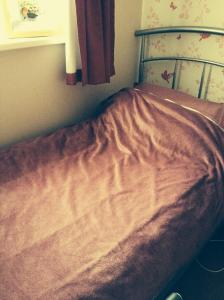
Welcome to the Health Activist Writer’s Month Challenge brought together by WEGO Health – a social network for all health activists. Again, I am participating in the annual Writer’s Month Challenge in which I will be writing about my health activism and health condition based upon prompts given.
The prompt reads as given:
“These are a few of my favourite things”…It may not be brown paper packages wrapped up in string or warm woollen mittens, but what are some of the things you love? What couldn’t you live without?
I have a lot of things in my life which I love – my friends, family and my pet dog Honey are at the top of that list but as I have written about them numerous times already, I have decided to concentrate on the things that I love which provide me with comfort on the bad days and helps me to stay positive.
So what is in my own personal ‘Comfort Box‘?
First of all is a pair of comfortable pyjamas. I have a pair in which the bottoms are chequered and a simple pain black top. It is great to have a comfortable pair of clothing to keep near the bed, as whenever I am stuck in bed due to my condition I still am able to change into something clean as an alternative to staying in the pair of pyjamas that you have had on all night! It is also convenient for those days in which you have no energy to be able to pick out an outfit and are planning to stay at home anyway. The pyjamas that I have kept for those many bad days, look more like lounge wear than conventional pyjamas so is less embarrassing if the postman knocks on the door to sign for a parcel!
Another favourite of mine to keep next to my bed is definitely my iPad. When stuck in bed, it can be extremely monotonous and dull. Therefore, I love my iPad as it keeps me entertained with a variety of different apps to use to suit my mood. For instance, there is the Kindle app for when I fancy to lose myself in a book, or even Netflix when spoons are nonexistent that all I have the energy for is to watch a television programme or film that requires little thought involved to enjoy, or sometimes watching videos of cute and adorable dogs on YouTube to cheer myself up when stormy clouds appear, blocking all sunshine and positivity in my life. I am even able to stream the many number of films and television programmes that I own from iTunes which can keep me entertained for hours. Then there a number of games that I have downloaded to the tablet computer; a great distraction from pain and dizziness that seems to plague my life so much. In my opinion, tablet computers are a must-have gadget for spoonies – it is easy and light to carry and can easily be used in bed, and the features that are available on tablets such as the iPad mean that you never have to be bored whilst stuck in bed again!

Above my bed, I have just placed some butterfly LED lights, which is now another one of my favourite things. As many of you know, I love butterflies and have many accessories and pieces of clothing which has butterflies all over them. When I saw these in a local shop, I thought they would make a lovely addition to my butterfly themed sanctuary. Not only do they brighten my room and provide light, for when I am awake with painsomnia (for explanation of term see my series of the ‘A to Z of Chronic Illness‘) but they just put a smile on my face when recuperating in my quiet, relaxing space at home.

I treasure all of the cards and mail that I have received from numerous friends. Their beautiful words and lovely sentiments never fail to bring a smile to my face and cheer me up when feeling low. These are perfect to read again and again, especially when suffering a relapse or flare in your condition. Letters from friends, or relatives remind you that you are not alone and that there are people who care when it can often feel that you are alone. One of my favourite letters is one I received from the extraordinary young woman ,Jodi Ann Bickley, who after suffering from ill-health herself established ‘One Million Lovely Letters‘; a project in which she writes letters to those who need a lift, whether it be because of illness, a breakup or bereavement. The letter is gorgeous; with beautiful meaningful words and complete with glitter and sparkle. The letter means so much as it is a reminder that I am so much more than my condition, and how I am not alone in the fight against my condition. It is a perfect antidote to a bad day due to my neurological condition.

Another item that brings me comfort is the little items that I have bought from the wonderfully positive company ‘The Itty Bitty Book Company‘. This small and ethical company promotes positivity through using inspirational and motivational quotes in little books, prints, cards and even badges. The quotes are all ones which I love and find helpful during times of struggle; I often take them to hospital appointments to help give me strength and positivity. The designs are also truly beautiful and the bright colours makes me instantly smile.

Another favourite thing of mine, is actually something that I created and that is my positivity board. It has everything that inspires me and keeps me positive despite chronic illness – letters from friends as well as cards that I have bought with inspirational and positive quotes on such as “Life isn’t about waiting for storm to pass but learning to dance in the rain” and “Everyone wants happiness, nobody wants pain, but if you want a rainbow you need a little rain”. It is these quotes and the idea of the positivity board which really helps in keeping me inspired and positive despite all the trials and tribulations that comes with the symptoms associated with my neurological condition. Recently, I have found some ceramic shapes that also has lovely and positive quotes on them and as I have not go much space in my bedroom to hang them, I have therefore decided to place them in my comfort box and get them out when I am having a rough day because of how I am feeling or stuck in bed due to the weakness in legs. These items are a great reminder that no matter how life may be tough in the present, there are still many more good moments to come; they inspire and uplift me when life with chronic illness becomes too hard to bear. They help me remain a positive person and that are why they are part of my favourite things and carefully placed in my comfort box.








